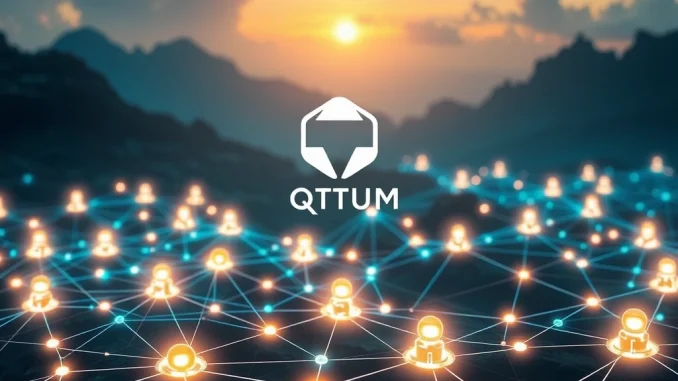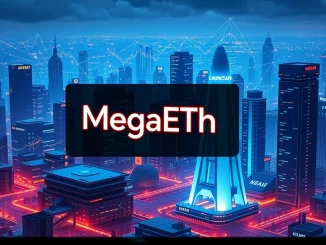
Get ready for a significant development in the world of decentralized technology! The convergence of artificial intelligence and blockchain is heating up, and Qtum AI is at the forefront of this exciting frontier. Qtum, an established open-source blockchain platform, is preparing to unveil a groundbreaking initiative that could redefine how AI and decentralized applications interact.
What is the Qtum AI Agent Network?
Qtum founder Patrick Dai recently took to X (formerly Twitter) to share pivotal news: the imminent launch of the AI Agent Network on Qtum.ai. This isn’t just a simple integration; it’s envisioned as a robust ecosystem designed for complex interactions between intelligent agents. The inspiration, notably, comes from concepts similar to Manus.im, suggesting a focus on collaborative and sophisticated AI behaviors within a decentralized environment.
At its core, an AI agent network allows autonomous software entities – ‘agents’ – to communicate, collaborate, and perform tasks. Integrating this onto a blockchain like Qtum provides inherent benefits such as transparency, security, and immutability for agent interactions and data.
Key Technologies Powering the Network
Patrick Dai highlighted two crucial technologies underpinning the upcoming Qtum.ai network:
- Multi-Party Computation (MPC): This cryptographic technique allows multiple parties to jointly compute a function over their inputs while keeping those inputs private. In the context of an AI agent network, MPC can enable agents to process sensitive data or execute tasks collaboratively without revealing their individual data or strategies to each other or the underlying platform. This is vital for privacy-preserving AI applications.
Agent-to-Agent (A2A) Communication: This is the direct or mediated interaction layer between different AI agents within the network. A robust A2A communication system is essential for agents to share information, coordinate actions, negotiate, and form complex relationships, much like independent entities interacting in a marketplace or a collaborative project.
These technologies aim to create a truly interoperable ecosystem where diverse AI agents, potentially developed by different parties, can seamlessly interact and collaborate on the Qtum blockchain.
Why Build a Decentralized AI Agent Network?
The move towards Decentralized AI addresses several limitations of centralized AI systems. By distributing the network across the Qtum blockchain, the project aims for:
- Increased Resilience: No single point of failure, making the network more robust against attacks or downtime.
- Enhanced Transparency & Auditability: Agent interactions and key decisions can be recorded on the immutable ledger.
- Greater Control & Ownership: Users and developers can have more direct control over their agents and data.
- Open Innovation: Lower barriers to entry for developers to build and deploy AI agents.
This vision aligns with the broader movement to bring the benefits of decentralization to emerging technologies like AI.
When Can We Expect the Launch and Token Integration?
According to Patrick Dai’s announcement, the AI Agent Network is scheduled to launch next month on Qtum.ai. A significant aspect of this launch is the promise of ‘full token integration’. While specifics are pending, this strongly suggests that the native Qtum QTUM token will play a crucial role within the network. Potential uses for the QTUM token could include:
- Paying for agent services or computations.
- Staking or bonding for agents to gain reputation or access resources.
- Governance rights within the Qtum.ai ecosystem.
- Incentivizing agent participation and network security.
This integration is key to creating a self-sustaining and economically viable decentralized AI ecosystem on Qtum.
What Does This Mean for Qtum and the Broader Blockchain AI Space?
For Qtum, this represents a bold step into a rapidly evolving sector. By focusing on foundational technologies like MPC and A2A communication, Qtum is positioning itself as a platform capable of supporting sophisticated Blockchain AI applications. This could attract new developers and users interested in building decentralized AI solutions, potentially increasing network activity and the utility of the QTUM token.
For the wider Blockchain AI space, Qtum’s initiative highlights the increasing maturity and ambition within the field. As projects move beyond simple AI-powered dApps to building fundamental infrastructure for decentralized intelligence, we are likely to see a surge in innovative use cases across various industries, from finance and supply chain to gaming and digital identity.
Challenges and the Road Ahead
While the potential is immense, building and scaling a successful AI Agent Network on a blockchain comes with challenges. These include ensuring efficient and cost-effective computation for AI tasks, managing complex agent interactions, ensuring the security and privacy of data processed via MPC, and driving adoption among AI developers and businesses. The success of Qtum.ai will depend on its technical execution, developer tooling, and ability to foster a vibrant community.
In Conclusion: A Glimpse into the Future
Qtum’s upcoming launch of its AI Agent Network is a significant event that signals the platform’s commitment to innovation at the intersection of blockchain and artificial intelligence. By focusing on key technologies like MPC and A2A communication and integrating the Qtum QTUM token, the project aims to create a foundation for a new era of decentralized, intelligent applications. As the launch approaches next month, the crypto community will be watching closely to see how this ambitious vision unfolds and what opportunities it unlocks for decentralized AI.



